Puget Systems Serenity SPCR Edition: Blissful Silence
by Dustin Sklavos on February 10, 2011 12:00 AM EST- Posted in
- Systems
- Intel
- Radeon
- Sandy Bridge
- Puget Systems
- Serenity SPCR
Gaming Performance
It's not going to surprise anyone to see the Puget Serenity take last place in all of these tests; the second-slowest gaming system we've reviewed sports a Radeon with more than twice the number of stream processors, more than twice the memory bandwidth, and higher clocks to boot. That said, many of the really high scores we've seen are largely academic: can anyone really tell the difference between 100 frames per second and 150? Without getting into the ridiculous argument of whether or not the human eye can see more than 30 frames per second (if it's not supposed to be able to, I'm pretty sure most of the video geeks in the readership—myself included—are superhumans), that framerate should still be your baseline for acceptable performance.
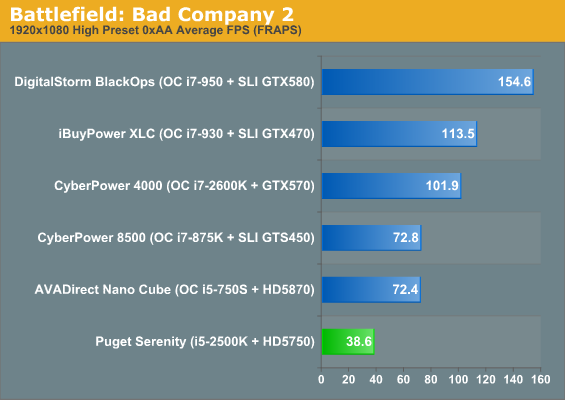
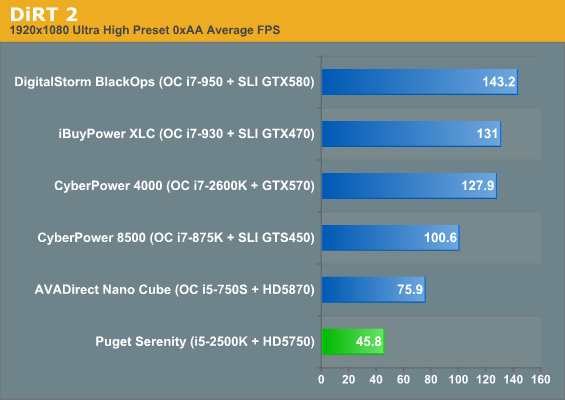
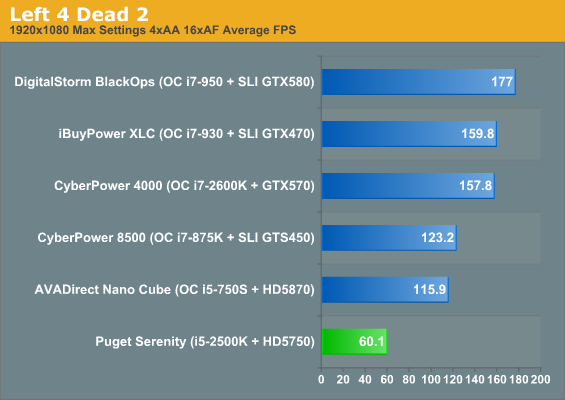
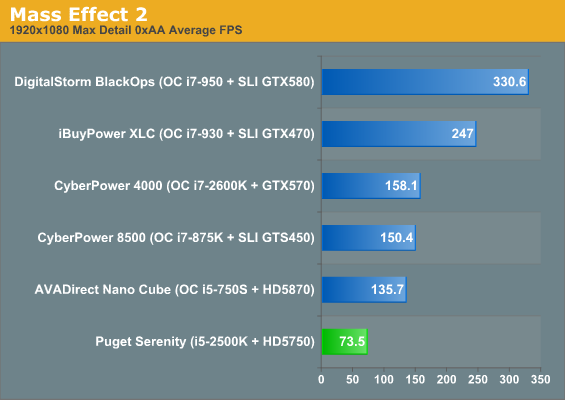
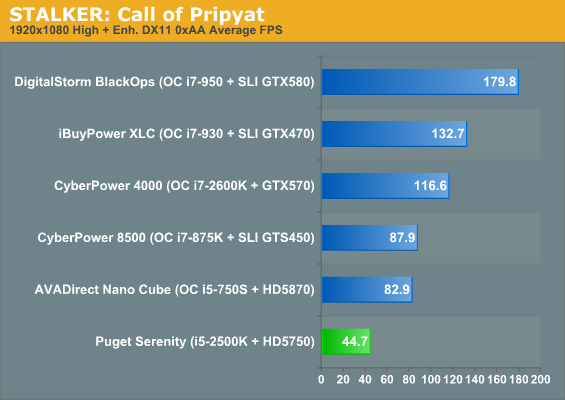
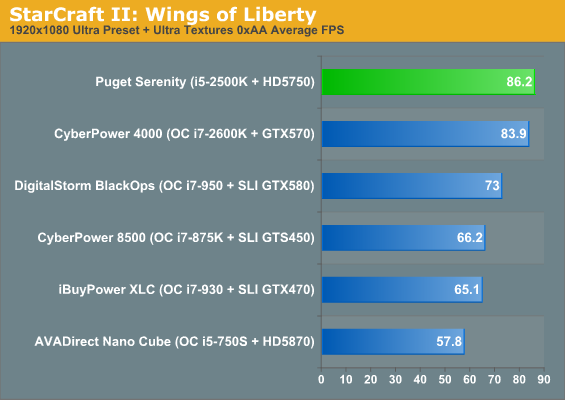
Outside of the stunningly CPU-limited StarCraft II, Puget Systems's Serenity is able to at least beat the 30fps mark by a fairly healthy margin. I like to see framerates in at least the forties to ensure smooth gameplay, but any of these games are perfectly playable at our "High" preset, which is basically running them at maximum or near-maximum (as in the case of Call of Pripyat) settings, 1080p, and no anti-aliasing (excepting Left 4 Dead 2). Knowing that we're a little bit close to our ceiling, let's see what happens when we do kick anti-aliasing in with our "Ultra" preset.
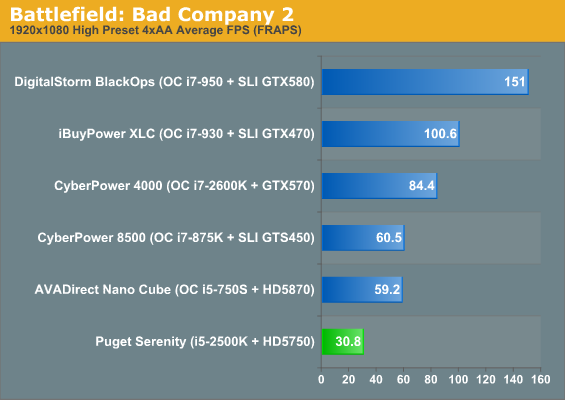
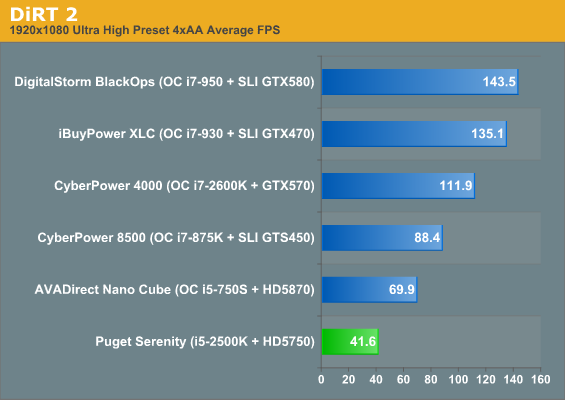
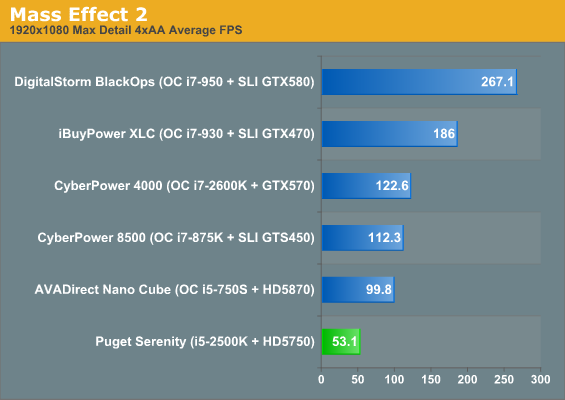
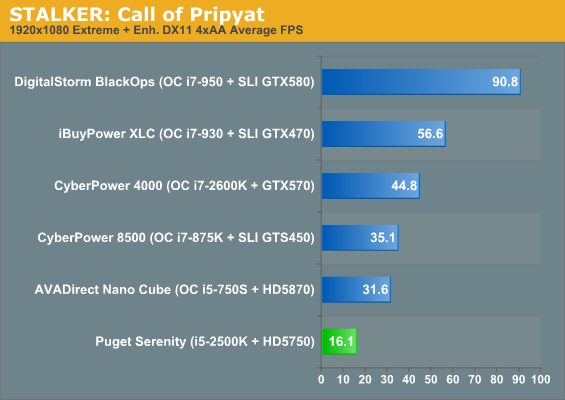
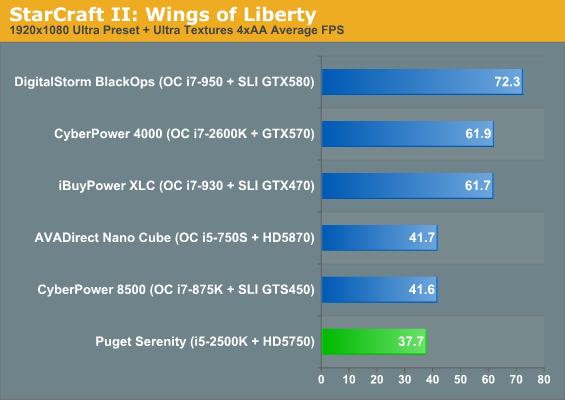
Battlefield: Bad Company 2 is pushing its luck and Call of Pripyat is fairly punishing even on our other systems, but for the most part these games (outside of Call of Pripyat) remain playable and fluid. Shifting the bottleneck back to the video card in StarCraft II sends the Serenity tumbling back to the bottom of the heap, but even then it's still very playable. Gamers looking for extra frames may want to disable anti-aliasing in that title anyhow, as the image quality difference is negligible when the performance impact is taken into account. Suffice it to say these settings are basically the threshold for the Radeon HD 5750, and while performance is good, the 6850 is going to be a welcome upgrade.










139 Comments
View All Comments
Sagrim - Thursday, February 10, 2011 - link
I've been in the market for a new computer as of late, and preferably a silent one at that. It has ultimately led me to Puget Computers. And, honestly, I'm seriously impressed with the company.A few oversights. First, as mentioned, Puget does not just slap together a computer and hope it is silent. They spent numerous hours designing the ideal configuration for their Serenity line, and only allow upgrades that meet the "standards" of that particular line.
Next, they actually spend serious time with your computer personally. The customer gets a notebook thanking them for their purchase, and also an entire slew of information pertaining to YOUR purchased computer (benchmarks, temps, etc). It also lists who worked on your computer, what time the work was started/completed -- and, this can also be viewed online via their website so you can track the construction of your computer.
Another nice addition is they ship a box of all the spare/extra parts that came with every component of your built system. All those extra cables, screws, ties, etc are sent to the user. A trip over to a popular online parts retailer will cost around $1,686 before tax, $1,728 after (depending on shipping method) to build this system almost exactly (figured in $219 for SB cpu, $190 for mobo). I also removed the "Instant Savings" from the quote. Give or take a few dollars, but that is well above the $1,000 quoted in the review. Bringing it to a difference of $421.
It essentially comes down to if $421 is worth having someone else build the system, test the system, quality check the system, create a binder that tells you ALL about your system, package it for safe shipment, and then offer a 1 year parts, lifetime labor. And, with excellent customer service in case anything does in fact happen to your system during transit, or for that next year (or more if paid for extra 2/3 year parts). Ultimately, that's the peace of mind you get from ordering custom built computers from truly respectable companies that value the customers.
Sorry for the slight rant, but after reading that it would cost someone about $1,000 for this type of system was a bit much. Where the price was being the main issue of complaint -- the gap isn't nearly as large as the reviewer made it seem. This is a respectable company, and have been around for quite some time.
Dustin Sklavos - Thursday, February 10, 2011 - link
Not $1,000 for this TYPE of system, just equivalent hardware performance. But you're right, they do go through major qualifying with their hardware and communication from order to shipment is excellent.And beyond all that, frankly this computer is dead silent. I can't stress enough what it means to not be able to hear a computer AT ALL. Again, though, I'm looking at things from how the average consumer might: pricetag, one year warranty, *BAMF*.
That's a shame but that's how a lot of shoppers work. If someone was willing to spend up to get premium service and a premium build, though, I'd have no reservations at all about recommending Puget Systems to them, and hopefully we're going to get more of their builds in-house for review soon.
Sagrim - Thursday, February 10, 2011 - link
Falcon Northwest only offers 1 year parts.ibuypower only offers 1 year parts, 3 years labor, lifetime technical "support."
Without scouring too much Dell's website -- they offer 1 year basic warranty, and their hardware warranty...however long that is.
Sagrim - Thursday, February 10, 2011 - link
I guess I'll clarify myself on this...Falcon Northwest's "basic" system (Talon) carriers a 1 year parts. All their laptops carry a 1 year parts as well. Their Frag Box/Mach V both carry a 3 year.
Though, in terms of price -- they all carry a hefty premium as well. A similarly configured Talon is a bit more than the Serenity without the overall sound quality.
Arguably, Puget should allow upgraded GPUs on their Serenity line. Find a quiet (not silent) line, and offer it. I think that would make it a lot more attractive to people who want a silent, but fully capable gaming machine. People aren't exactly used to paying a premium on virtually silent pc's yet, but big gpu numbers seem to make all the sense in the world for increasing price.
JarredWalton - Thursday, February 10, 2011 - link
Ah, but comparing to FNW is comparing to one of the most expensive boutique system builders around. It's difficult to quantify all of the elements of customer support without being a long-term customer of a company, so all we can really say is how they dealt with us. Puget (and FNW the last time I worked with them) both put in a lot of one-on-one time to make sure things are top notch, and you pay for that experience.Anyway, I've priced out everything I think I'd need to build a similar "silent" system -- all parts from Newegg. I get a total price of around $1560 with shipping. That includes sound dampening foam, Scythe fans, OS, and all the other parts used by Puget. So by that measure, the price premium is "only" about $600 -- or put another way, it's almost a 40% markup over what Newegg charges. And I hate to break it to you, but Newegg makes a profit as well, so if you were getting bulk reseller pricing I'd say Puget is at least a 50% markup.
Taft12 - Thursday, February 10, 2011 - link
Puget is certainly not a "bulk reseller". They buy in quantities that might qualify for a few percent less than retail. In many cases, they can (and almost surely do) buy parts CHEAPER from Newegg than the distribution channel.GeorgeH - Thursday, February 10, 2011 - link
Newegg does make a profit. From their financial statements, they average a ~10% markup over cost; taking overhead into account, their profit margin is around ~1.5%.There's no way in hell Puget is getting the same kind of volume discounts as Newegg, which does over $1 Billion in sales every year. I could believe that Puget's cost is ~5% under Newegg's average prices, but not much more than that.
Subtract ~5% from ~$1500, and you get ~$1400. $2000 is a healthy markup there (~40%), but the article is claiming Puget's markup is twice that.
But what's a factor of two here or there, right? $1000, $500; who really cares?
Taft12 - Thursday, February 10, 2011 - link
Dell for one (and almost certainly HP, Lenovo, etc) offer up to 4 years hardware warranty INCLUDING on-site service for business PCs and servers.Of course you can't get that even if you wanted to on $499 Inspiron trash, but real business warranty coverage is not something you, me, Falcon Northwest or Puget Systems could ever hope to offer.
Hubb1e - Thursday, February 10, 2011 - link
Dustin, your comment about price made it sound like you could get the same components for $1000. When you take into account the extra fans, the quality PSU, the CPU cooler, and some of the other extras you are closer to Sagrim's pricing.Yes, you can get a computer with similar performance (same CPU and 5750 video card) for $1000, but you won't get these components for $1000 and I think you should make that clearer in your article.
This system is truly unique in the marketplace, and while 11db isn't needed for most people, it really shows the capability of Puget and as a flagship quiet model it gives them a lot of credibility in the marketplace with their other machines.
On another note, I would have liked to have seen you try a bit of overclocking on the CPU, at least at stock voltage, because I'm sure the system had plenty of cooling headroom for a bit more clock.
Paulman - Thursday, February 10, 2011 - link
Really? The review definitely makes it sound like the EXACT SAME components would cost only $1000 fron Newegg:"The hardware configuration is largely up to the end user; the quote on our price sheet listed our test system at a fairly onerous $2,149. We're really looking at a little over $1,000 in parts here judging from a trip to NewEgg and some quick and dirty math. No one likes seeing 100% markup on a computer that costs over two bills, so from a pure value perspective the Serenity SPCR Edition can feel like a real bust."
If the exact same components actually cost more than $1000, I think the review should be updated/corrected with the approx. Newegg price for the SAME components. I definitely feel like I got the wrong idea from the first reading of this article (on that issue) :P